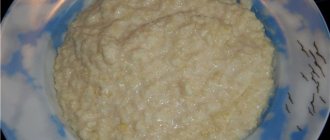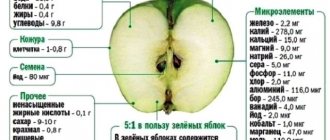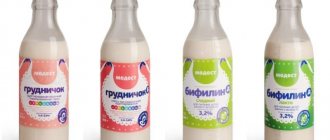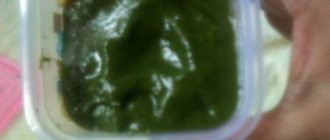After one year of age, a child’s menu should include milk, cottage cheese, sour cream and cream. These foods are rich in animal protein, which is necessary for a growing body. Having introduced them to the baby, parents begin to wonder whether it is possible to diversify the children's diet with other fermented milk products, for example, fermented baked milk. Let's consider why the drink is useful, when and in what quantity to administer it.
Composition and benefits
Ryazhenka is a natural fermented milk product obtained by fermenting milk. Thanks to its pleasant taste and caramel shade, children like it more than kefir. It contains an optimal ratio of proteins, fats, carbohydrates, calcium, potassium, magnesium, vitamins A, B and C. This allows them to be well absorbed in the baby’s body.
In addition, fermented baked milk is useful because:
- It does not contain pathogenic bacteria, which are destroyed during prolonged heat treatment. There are also no thickeners, preservatives, flavorings or flavor enhancers.
- Contains lactic acid, which has a positive effect on the functioning of the kidneys, gastrointestinal tract, and intestinal motility.
- Its balanced composition helps the body cope with infections and increases the strength of bones, nails, and hair.
- The product can be given to children with lactase deficiency (a condition when the body does not digest food containing lactose, which is contained in dairy products).
- It is the highest in calories among fermented milk products, so it is well suited for a snack, satisfying hunger and maintaining a feeling of fullness for a long time.
- Helps remove toxic substances from the body.
- Improves digestion and stool.
When can you give fermented baked milk to a child?
When can you introduce your child to fermented baked milk? What is useful in it for the baby? When and how much fermented baked milk can be given to a child? Let's answer these questions about complementary feeding
Cottage cheese, yogurt, kefir - everyone has heard about the benefits of these fermented milk products for babies. Already from 7-8 months you begin to introduce them to your baby. What about fermented baked milk? It's so delicious! Both adults and children adore its caramel shade. When can you let your baby eat fermented baked milk? Let's look at introducing fermented baked milk into children's diets.
The benefits of ryazhenka for children
This natural fermented milk product is very useful:
- proteins, fats, carbohydrates are in optimal proportions and are easily digestible;
- it contains a lot of vitamin C, A, group B, calcium, potassium and magnesium;
- there are no pathogenic bacteria in it;
- it helps strengthen the immune system;
- has a beneficial effect on children's digestion;
- can be included in the menu for children with lactose intolerance.
Compared to other fermented milk products, fermented baked milk is quite high in calories. This is a complete meal that helps quickly satisfy hunger and energize your child. If dinner is still far away, then fermented baked milk is an excellent option for a nutritious afternoon snack.
However, despite all its advantages, allergies to fermented baked milk rarely occur. And it should not be used by children under 10-11 months due to the high load on the kidneys.
When can fermented baked milk be administered to a child?
Complementary feeding with fermented baked milk can be started after 10 months due to the above contraindication.
Ryazhenka should be introduced like any other new product, starting with 1 teaspoon and increasing to a serving over 5-7 days. At the age of up to 1.5 years, the daily volume of fermented baked milk should not be more than 100 ml, and by two years old, up to 200 ml of fermented baked milk can be given per day.
Unfortunately, in our country no one produces special fermented baked milk for baby food on an industrial scale so that it can be found in any supermarket. However, you can use special starters to prepare a tasty and healthy product. All you need is baby milk and a bacterial culture. It is convenient to cook fermented baked milk in a multicooker on yogurt mode, but a regular thermos or even a battery with a blanket will do.
As for the time when it is better to give fermented baked milk to a child, in this case we support the opinion of Dr. Komarovsky, who says that it is better to drink fermented baked milk in the afternoon. Let it be a tasty and nutritious afternoon snack or a drink that your baby drinks before bed.
Harm of fermented milk product
In addition to the positive qualities of fermented baked milk, it also has some disadvantages:
- may cause allergies, so it should be introduced into complementary foods gradually;
- if the rules of transportation and storage are not followed, it can cause gastrointestinal disorders;
- It can be given to babies only in limited quantities, since in excess it puts a high load on the kidneys;
- For overweight children, it is better to give the drink low in fat and in small quantities;
- It is not advisable to combine with protein products (eggs, meat, fish).
Benefits for children
- For a baby’s fragile gastrointestinal tract, live lactic acid bacteria will become helpers: they will improve appetite and improve digestion.
- Like other “milk”, fermented baked milk is rich in calcium: one glass contains up to 25% of the daily requirement of calcium and up to 20% of phosphorus.
- The product contains a lot of milk fats, which help absorb calcium, which is necessary for the bones and teeth of a growing body.
- The rich taste does not require the addition of sugar or sweeteners. This makes the child’s snack as safe as possible.
- You can prepare many healthy dishes using fermented baked milk: mousses, cocktails, desserts. They will be a healthy alternative to unhealthy sweets and carbonated drinks and will diversify the children's menu.
- The drink is allowed for children with lactase deficiency.
Children's Imunele: reviews from doctors and parents.
At what age can a child be given fermented baked milk and in what quantity?
Ryazhenka is introduced into the infant’s diet after kefir at 10-11 months. If he has problems with digestion, it is advisable to postpone introduction to her until the age of 12-18 months.
A baby up to one year old can be given no more than 50 ml of this lactic acid product per day, and 70-80 ml per year. By 1.5 years the norm is 100 ml, by 2 - 200 ml.
It is advisable to start complementary feeding with a fermented milk drink prepared independently from baby milk and a special starter, for example, Vivo, Laktoferm, Yoghurtel or SvoyYogurt. After a year, a child can be given fermented baked milk, produced specifically for baby food. After 3 years it will be possible to switch to a regular one.
At first, they only give fermented baked milk in its pure form. Then you can add berries, fruits, and jam to it. You can also use it to prepare various desserts and dishes.
Standards of use
You need to start introducing fermented baked milk into complementary foods with caution, with 1 tsp. With good tolerance and no allergies, it is recommended to double the achieved volume every day.
| Age, in months | Norm of fermented baked milk, in ml |
| up to 12 | 50 |
| 12 or more | 80 |
| 24 | 200-250 |
Exceeding the volume is not recommended. You can gradually add berries, fruits, honey or other ingredients to fermented baked milk, which will allow you to get a complete and very healthy snack.
You can add fruits and berries to fermented baked milk
Komarovsky advises limiting yourself to 1 dose of this type of fermented milk per day, since its excessive consumption creates a serious burden on the kidneys.
Up to three years of age, it is recommended to purchase fermented baked milk for your child, intended for baby food. After reaching the specified age, you can switch to the standard fermented milk option.
How to introduce into complementary foods
Ryazhenka can cause an allergic reaction and stomach upset, so it must be introduced into children's menus gradually. The first acquaintance begins with one teaspoon. It is better to give the drink in the first half of the day in order to monitor the body’s reaction to its administration throughout the day. If you experience problems with digestion or allergic skin rashes, you should postpone getting acquainted with it for a while. If no side effects are found, then the portion can be gradually increased, each next time giving 2 times more than the previous one.
It is advisable to prepare fermented baked milk for children yourself; if this is not possible, then the choice of a store-bought drink must be taken extremely responsibly:
- The packaging must be intact, not wrinkled, clean, with the name, expiration date, and manufacturer clearly legible. A high-quality product that does not contain preservatives cannot be stored for more than one week.
- It is better to buy a fermented milk drink in a glass container, in which its creamy color and uniformity are clearly visible.
- Before giving fermented baked milk to your child, you need to smell and taste it.
Harm of ryazhenka in baby food
A serious disadvantage of fermented baked milk is the high risk of an allergic reaction. This is due to the fact that when a fermented milk product undergoes heat treatment, the proteins thicken, forming allergenic substances.
Allergies are accompanied by the following symptoms:
- small red rashes on the skin of the face and body;
- stool disorder;
- flatulence, bloating;
- painful colic in the abdomen;
- increase in body temperature.
In some cases, an allergy to fermented baked milk may be accompanied by a runny nose or increased lacrimation. In the most severe cases, an allergic reaction causes Quincke's edema or anaphylactic shock - these are dangerous complications that pose a danger not only to the health, but also to the life of the baby. Therefore, if allergy symptoms appear in a small child, this product should be excluded from the diet, and the baby should be shown to a doctor.
What goes with it?
Ryazhenka is an indispensable product of the children's menu, which is used as one of the main components to create various dishes.
Pancakes without eggs
They turn out very fluffy and tasty. You can prepare milk chocolate glaze for the pancakes. This dish can be prepared for children over 1.5 years old.
Ingredients
- fermented baked milk - 200 ml;
- flour - 100 g;
- granulated sugar - 1 tbsp;
- salt - 0.5 tsp;
- baking soda - 0.5 tsp;
- vegetable oil - 1 tbsp;
- banana - 1 pc.
Cooking method
- pour fermented baked milk into a bowl for kneading dough;
- add flour and mix thoroughly with a whisk so that there are no lumps;
- the thickness of the dough should resemble sour cream (if it turns out thicker, then you should add a little more fermented baked milk, if it’s liquid, add more flour);
- add soda, sugar, salt, vegetable oil to the dough and mix thoroughly;
- cut the banana into cubes, add to the dough and mix gently;
- put the frying pan on the fire and grease with vegetable oil;
- take a tablespoon and place the dough in a frying pan, frying the pancakes on both sides;
The pancakes should be served hot with jam or chocolate glaze.
Fruit and berry mousse
This is a healthy and easy dessert. It can be prepared for babies over 12 months.
Ingredients
- fermented baked milk - 500 ml;
- apple - 1 piece;
- banana - 1 piece;
- cherry - 1.5 tbsp;
- sugar - 1 tsp.
Cooking method
- Peel and pit the apple and cut into small cubes;
- Peel the banana and chop into small pieces;
- Peel the cherries and cut them into several pieces;
- mix all ingredients and grind in a blender until a homogeneous mass is formed;
- Pour the mixture into bowls.
Cheese flatbreads
They are delicious, nutritious and easy to prepare. They can be given to children over 2.5 years old.
Ingredients
- fermented baked milk - 400 ml;
- egg - 2 pcs;
- flour - 450 g;
- cheese - 200 g;
- salt - 0.5 tsp;
- soda - 0.5 tsp.
Cooking method
- beat eggs with salt, add fermented baked milk and mix thoroughly;
- grate the cheese on a fine grater, pour into a bowl;
- flour with soda, add to the rest of the products and mix;
- Divide the resulting dough into 8-10 parts;
- Roll each part into a ball and form it into a small cake;
- put the frying pan on the fire and grease with vegetable oil;
- Place each flatbread in a frying pan and fry on both sides.
Calorie content and composition
According to GOST 31455-2012, the following products are allowed in fermented baked milk:
- milk (cow's raw, skimmed, powdered);
- cream (whole, dry);
- whole milk powder;
- starter cultures and bacterial concentrates;
- water.
Calorie content of 100 g of product: with a fat content of 3.2% is about 57 kcal, with a fat content of 6% - 85 kcal.
Natural fermented baked milk is rich in useful substances necessary in the children's diet:
- fatty acid;
- disaccharides;
- macro- and microelements: calcium, potassium, sodium, magnesium, iron;
- vitamins A, B1, B2, C, PP.
Possible harm
Contraindications in childhood:
- introduction to complementary foods before 8 months (puts additional stress on the gastrointestinal tract and kidneys);
- exceeding acceptable age standards (negatively affects digestive processes);
- simultaneous use with other protein products (poor compatibility).
Carefully! Consuming a low-quality product can lead to serious poisoning. This is especially dangerous for a child's body.
Allergy
The increased risk of an allergic reaction to fermented baked milk is due to the fact that it is the only fermented milk product that is subject to heat treatment. During heating, proteins curdle and form allergenic aggregates.
However, allergies to fermented baked milk are rare in children. Her symptoms:
- profuse loose stools for a long time;
- small red rash on the face and other parts of the body;
- increased gas formation;
- complaints of abdominal pain;
- lethargy, drowsiness.
For reference. If one of the parents has an allergy to fermented milk products, the child may also be predisposed to it.
Treatment involves eliminating the cause, so if unpleasant symptoms occur, the product is excluded from the diet, and the baby is taken to see a doctor.
Attention! In severe, life-threatening cases, an antihistamine should be given and an ambulance should be called immediately.
How to choose
When choosing fermented baked milk in a store, pay attention to the expiration date and appearance of the packaging. A swollen package may indicate a violation of storage standards, even with a good shelf life. It is also not worth buying a product in damaged or opened packaging.
| Index | Characteristics |
| Consistency | Homogeneous thick liquid without signs of gas formation, with a clot. |
| Taste/smell | Pure, fermented milk, mild, with a pronounced taste of pasteurization. |
| Color | Uniform light cream. |
On a note. For baby food, it is advisable to take fermented baked milk in a glass container with a shelf life of up to 5–7 days.
If you have any doubts about the quality of the product, it is better to refuse the purchase, especially when choosing baby food products.
The best brands of ryazhenka according to the results of the “Test purchase”:
Fat content 3.2%:
- Rosagroexport;
- "House in the village";
- "Opolje";
- "Prostokvashino";
- "Savushkin product"
Fat content 4%:
- "Vkusnoteevo"
- "Brest-Litovsk";
- "House in the village";
- "Yours sincerely";
- "Milava".











